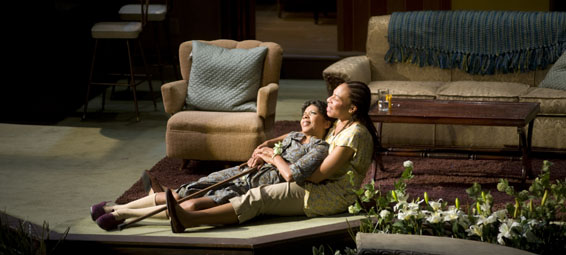Not to jinx it, but Regina Taylor’s The Trinity River Plays is the kind of show that gets the attention of the Pulitzer committee. Brilliant American playwright: check. Regional authenticity: check. Drama of significance: check, check. The trilogy, which made its world premiere Friday evening at the Dee and Charles Wyly Theater, is still in development, but it’s likely headed for the promised land. With some adjustments, more chiropractic than surgical, this show has a big future.
The Trinity River Plays is a partnership between the Dallas Theater Center and Chicago’s Goodman Theatre. It will migrate to the Goodman in January, after the Dallas run (and from Goodman, the aim is quite clearly Broadway). Its director, Ethan McSweeny, has staged more than 60 productions around the country, and made his Broadway debut in 2000 with the revival of Gore Vidal’s The Best Man. In other words, he’s the kind of experienced guy producers and playwrights love.
Regina Taylor, an award-winning actor and playwright who wrote the much-lauded production “Crowns,” was born in Oak Cliff. Her show is a trilogy of three plays: Jar Fly, Rain and Ghost (story), and is described as an “intensely personal” production, ostensibly borrowing from Regina Taylor’s own life. The protagonist, Iris Spears, is a young woman who escapes her dysfunctional middle-class Dallas life, and heads to New York to become an accomplished writer. The show is chock-a-block with references that will please locals, though it’s debatable, once the show leaves the Wyly, whether the plethora of mentions (inside jokes about the Trinity Bridge?) do much to advance the storytelling.
The cast: Iris is played by Karen Aldridge, who has credits as long as her very long legs; she is intelligent, poetic, and angry. Christiana Clark plays three mesmerizing incarnations of Jasmine, Iris’s cousin. Penny Johnson Jerald plays Rose, Iris’s remote, orderly mother. She’s familiar to viewers of ER, The Larry Sanders Show, 24 and has directed more than 45 plays. Jacqueline Williams, who plays Iris’s comic-tragic Aunt Daisy, has television credits as well a string of major roles in Chicago and Goodman productions. There’s nary a slouch among them.
So it’s not a shock that most of the acting in The Trinity River Plays is stellar. Likewise, the staging is inspired. The writing, in discrete clumps, is laugh-out-loud funny and smart. But for all of this, the production feels like a photograph without a focal point. The audience has the sensation of many lives, many issues, many cultural details, all of it presented by great actors. But there is an emotional disconnect, and it’s difficult to understand, at a gut level, where this show really wants us to look, or what it wants us to feel.
The set design by Tony-award winner Todd Rosenthal may be a clue to the problem. So often the power of live theater is not only what is said or shown, but what is triggered or suggested to the audience’s imagination, memory, or emotions. The jam-packed 1970s suburban house in The Trinity River Plays leaves nothing to the mind’s eye; it looks more like a scene from a television set than the stuff of the stage. The garden is a crowded border of plastic flowers and weird artificial earth. When these props play the role of the chief object of Iris’s mother’s affection and nurturing, more than what she is able to summon for her own daughter, the staging somehow insults. When it rains — real rain! — the authenticity of the water falling from the ceiling seems oddly paired with the garden, which looks much like an aisle at Michael’s. If there is messaging there, it was lost on this viewer.
Underneath this highly rendered stage of middle-class suburban life, the strong black women bury their secrets. And it is the burial of these secrets that erodes the women’s tremendous strengths. Iris, Rose, Jasmine, and Aunt Daisy all heap upon their secrets weird artificiality (like the soil?): self-mockery, whining, manipulation, pretty hats, birthday cakes, gin, drugs, and sex. Mostly, we don’t know how all of this makes them feel. We can’t connect with them, perhaps because they each are so fundamentally disconnected from their own truths.
When a show attempts to tell the tale of two generations in three plays with four main characters, plot details take on greater significance — much like they do in a crime or mystery story. We wish we knew more fully why Iris’s mother freely bestows affection upon Iris’s cousin, Jasmine, who, for two parts of the trilogy, is a no count. And why does Rose spend so much energy being tough and cold to Iris? (Rose tells Iris that she looks like her father, but is that the only reason? If Iris was a “mistake” did Rose really resent her her whole life?) Off-stage and unbeknownst to us, Iris acquires a boyfriend. We learn about this abruptly — when, how, why? — and the off-stage character, Iris’s father, as well as his relationship with Rose is a buried secret and essentially remains so. Tell us more.
These are minor holes, but they distract from Regina Taylor’s brilliant material. The Trinity River Plays is about the human spirit and the destructive power of buried and denied truths. We laugh with the sublime women in this story. If only we could have cried.
Photo: Karen Aldridge and Penny Johnson Jerald in ‘Rain.’ (Photo by Brandon Thibodeaux)





